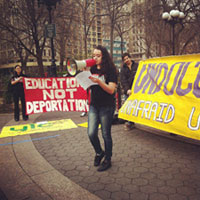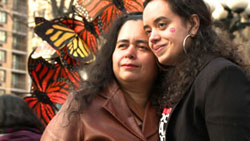Newsroom Archive
 For junior Angy Rivera, whose major is Culture and Deviance Studies with a minor in Human Services, her path to graduation has been, as she describes it, a roller coaster. In addition to the typical challenges of being a student and planning one’s future, Rivera’s college life is undermined by an all-encompassing issue: she is one of tens of thousands of young people living in this country who are undocumented, meaning she is unable to obtain, among other things, a driver’s license, state identification, working papers and federal financial aid for higher education.
For junior Angy Rivera, whose major is Culture and Deviance Studies with a minor in Human Services, her path to graduation has been, as she describes it, a roller coaster. In addition to the typical challenges of being a student and planning one’s future, Rivera’s college life is undermined by an all-encompassing issue: she is one of tens of thousands of young people living in this country who are undocumented, meaning she is unable to obtain, among other things, a driver’s license, state identification, working papers and federal financial aid for higher education.
Rivera was brought to the U.S. from Colombia when she was three. She grew up in the U.S. attending elementary school and graduating high school, all the time aware that she and her mother were undocumented. But, the reality of her immigration status did not affect her until she attended an Open House in 2009 at John Jay when she met with a financial aid advisor. Rivera recalled she was told that she could not apply for FAFSA because she was undocumented. As a result, she could not attend college since she neither had enough money to pay for tuition nor did she have legal residency in New York State to apply for government education loans.
“I experienced great shame and embarrassment as a result of that meeting, and it was then that I decided I needed to change my situation. I needed to take action and find out about my opportunities. I came across the New York State Youth Leadership Council (NYSYLC), and I learned about the DREAM Act. I realized I could change the reality I was living,” said Rivera.
 Rivera accepted a fellowship from the NYSYLC and has become an active member in speaking out against injustices committed against undocumented people. She and the Council created the advice column, Ask Angy, and in 2010 they organized the first Coming Out of the Shadows rally, which has become an annual event: Every March before press, cameras, and hundreds of people, individuals tell public stories about their immigration status.
Rivera accepted a fellowship from the NYSYLC and has become an active member in speaking out against injustices committed against undocumented people. She and the Council created the advice column, Ask Angy, and in 2010 they organized the first Coming Out of the Shadows rally, which has become an annual event: Every March before press, cameras, and hundreds of people, individuals tell public stories about their immigration status.
Rivera says the act of telling one’s story publically relieves an emotional and psychological burden of secrecy, and it is empowering. This past year, Rivera’s mother, who was initially skeptical of her daughter’s public advocacy, came out for the first time and told the story of her own immigration status. In 2010 Rivera and the Council advocated for Congress to pass the DREAM Act, which failed in the Senate by five votes. They participated in a hunger strike, mobilized for the New York DREAM Act, and they hold many clinics and workshops about Deferred Action for Childhood Arrivals, which is a policy that would suspend deportation of undocumented youth and provide them with working papers for two years.
“Being undocumented feels very limiting and very frustrating, but it has also been a source of empowerment,” said Rivera. “It has been a catalyst to motivate me to do something because you can either stay stuck in that situation and feel bad for yourself, or you can do something about it. I have faced all these uncertainties and injustices, and I was able to channel all that sadness, all that loneliness and find a community.”
Rivera had started a business selling homemade bracelets to pay for her college tuition in 2012. After promoting them on Twitter and Facebook, a New York Daily News journalist conveyed interest in writing an article about Rivera titled, “Undocumented College Students Raise Tuition Money Online.” A retired MTA worker read the article and made an anonymous donation, paying for a whole semester for Rivera. Rivera will be the subject of a documentary, “No Le Digas A Nadie” that will be released next year.
“I’ve seen myself grow over the past few years. My hope for the future is that this won’t be an issue anymore and that people won’t have to fight for things like an ID or to go to school. My hope is that the DREAM Act becomes a reality, but I know the fight doesn't stop there.”
For her career, Rivera would like to work in social services with victims of crime and abuse.
“I don’t consider myself an inspiration or a leader. Everybody can be a fierce advocate for justice. Everyone can do something about their situations, but not everyone does. It’s just about tapping into that power and pushing yourself to do something.”
 Inside JJC (Faculty & Staff)
Inside JJC (Faculty & Staff) Technology Services Status
Technology Services Status

